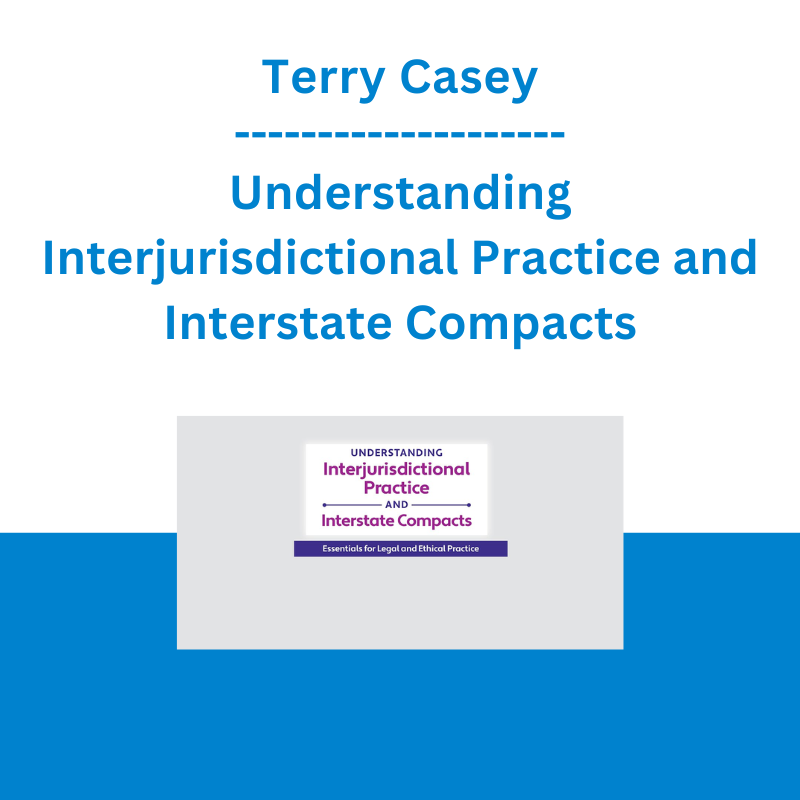*** Proof of Product ***
Exploring the Essential Features of “Terry Casey – Understanding Interjurisdictional Practice and Interstate Compacts: Essentials for Legal and Ethical Practice”
Speaker:Terry Casey, PhDDuration:5 Hours 54 MinutesFormat:Audio and VideoCopyright:Apr 19, 2024
Media Type: Digital Seminar
Description
The opportunities to practice across state lines are increasing quickly and are dramatically changing the practice landscape.
It’s a great way to expand your reach or even offer specialized services. The possibilities to build the practice you want are as diverse as the clients you aim to serve.
To take advantage of these opportunities mental health professionals must first identify the vitally important legal, ethical, and practice issues that are involved. However, navigating the relevant federal and state laws, licensing rules, and codes of ethics can be a challenge for any therapist… So we made it easy for you!
This practical seminar will make it easy for you to identify the nuances of legally and ethically starting your cross-state practice.
Join ethics expert Terry Casey, PhD, who has helped thousands of therapists understand interstate compacts as he explains these complex issues, walks participants through the essential issues, and provides key resources for all attendees. You’ll learn:
- What you need to know about providing teletherapy to (or from) a state where you are not licensed
- The five special provisions for legally practicing across state lines
- Interstate compacts – the huge implications for private practice and organizations
- How to avoid the pitfalls of teletherapy across state lines
- And much more!
Participants will leave equipped to make determinations about when interjurisdictional practice is legal and ethical (and when it is not).
Register today!
Speaker
Terry Casey, PhD, is a licensed psychologist, HSP health service provider with over 30 years of professional experience, including a 16-year tenure as the director of counseling & psychological services for a non-profit agency with over 30 counselors at over a dozen locations. He is in private practice in Franklin, Tennessee, teaches ethics and professional issues in counseling at Lipscomb University’s graduate program in clinical mental health counseling, and guest lectures at Trevecca Nazarene University’s PhD program in Clinical counseling. Dr. Casey also served for several years as the chair of the ethics committee for the Tennessee Licensed Professional Counselors’ Association and in an advisory capacity for graduate counseling programs at two universities. He has presented frequently on ethics to organizations such as the American Counseling Association, the Tennessee Licensed Professional Counselors Association, the Nashville Area Association of Christian Counselors, and others. For more information, visit his practice website at rencounselingtn.com.
Speaker Disclosures:
Financial: Dr. Terry Casey maintains a private practice and is a faculty member of Lipscomb University. He is a published author and receives royalties. Dr. Casey receives a speaking honorarium and recording royalties from Psychotherapy Networker and PESI, Inc. He has no relevant financial relationships with ineligible organizations.
Non-financial: Dr. Terry Casey is a member of the American Psychological Association, the Tennessee Psychological Association, the Tennessee Licensed Professional Counselor Association, and others. For a complete list, please contact [email protected].
Objectives
- Differentiate between the federal laws, state statutes, licensing regulations, and codes of ethics that govern teletherapy.
- Identify how jurisdictional issues affect teletherapy and in-person therapy.
- Evaluate the essential issues for providing teletherapy ethically and legally.
- Define the four scenarios in which interjurisdictional practice takes place.
- Identify the five legal provisions for providing therapy across state lines.
- Evaluate the function, advantages, and limitations of interstate compacts for mental health professionals.
Outline
The Legal Landscape for Interjurisdictional Therapy
- What you need to know about federal privacy laws and regulations (e.g., HIPAA)
- How to determine the state laws/statutes that affect your practice
- State executive orders
- The latest state licensing rules/regulations and policies
Teletherapy: Legal and Ethical Essentials
- Secure internet connection
- Secure video platform
- Competence of the provider
- Policies & informed consent
- Insurance related issues
Interjurisdictional Practice
- Understand important jurisdictional issues
- The five provisions for legal interjurisdictional practice
- The four scenarios that depict interjurisdictional practice
- Misunderstandings and myths regarding interjurisdictional practice
Interstate Compacts: How they function, advantages and limitations for mental health professionals
- Understand occupational interstate compacts
- Interstate compact for psychologists
- Interstate compact for professional counselors
- Interstate compact for social workers
- Compact for marriage and family therapists?
- Implications of interstate compacts for practices and organizations
Practice vignettes
- Vignette #1 – The University Student Client
- Vignette #2 – Aimee’s Working Trip
- Vignette #3 – Teletherapy Dilemma
- Vignette #4 — The Traveling Client
- Vignette #5 — Dubious Decisions
Strategies, Tips and Resources for Avoiding Ethical & Legal Problems
Target Audience
- Counselors
- Social Workers
- Psychologists
- Case Managers
- Therapists
- Art Therapists
- Marriage & Family Therapists
- Other Mental Health Professionals
Please see the full list of alternative group-buy courses available here: https://lunacourse.com/shop/










 Dave Landry - Stock Selection Course
Dave Landry - Stock Selection Course  Jesse Livermore Trading System - Joe Marwood
Jesse Livermore Trading System - Joe Marwood  Oliver Velez - Essential Strategy Of Trade For Life
Oliver Velez - Essential Strategy Of Trade For Life  Chris Capre - Advanced Price Action Ongoing Training & Webinars
Chris Capre - Advanced Price Action Ongoing Training & Webinars  Trade Like Mike - The TLM Playbook 2022
Trade Like Mike - The TLM Playbook 2022  Workflow, Time Management and Productivity for Creatives - Lisa Congdon
Workflow, Time Management and Productivity for Creatives - Lisa Congdon  Matthew Kratter - Trader University
Matthew Kratter - Trader University  Toshko Raychev - Profit System + ITF Assistant
Toshko Raychev - Profit System + ITF Assistant  George Fontanills & Tom Gentile - Optionetics 6 DVD Series Home Study Course (Digital Download)
George Fontanills & Tom Gentile - Optionetics 6 DVD Series Home Study Course (Digital Download)  Emanuele Bonanni - My Trading Way
Emanuele Bonanni - My Trading Way  Money Miracle - George Angell - Use Other Peoples Money To Make You Rich
Money Miracle - George Angell - Use Other Peoples Money To Make You Rich  Julie Stoian & Cathy Olson - Launch Gorgeous - Funnel Gorgeous Bundle
Julie Stoian & Cathy Olson - Launch Gorgeous - Funnel Gorgeous Bundle